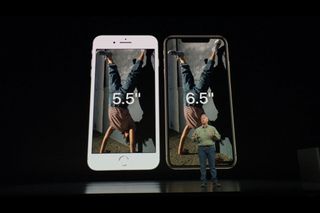Today's smartphones are PCs — that's a challenge (and opportunity) for Microsoft
Throughout the last decade, the mobile evolution created a new normal. We're now carrying very powerful, slate-shaped, touchscreen computers in our pockets.

This is obvious to some, but a matter of semantics to others. Smartphones, despite the word "phone" in the name, and their use for voice communication after their primary use for web surfing, listening to music, gaming, text-based communication and more are categorically more PCs than phones.
Usage patterns have transitioned from a phone-focus, and manufacturers purposefully design these devices to fit tablet (and in Samsung's Dex's case, desktop) usage scenarios. Device dimensions average between 5.5- and 6.5-inches, are powered by laptop and tablet processors, have 4 to 8 gigabytes of RAM, up to 512 gigabytes storage and expandable storage capacities into the terabytes. They have high-resolution displays, advanced artificial intelligence (A.I.) and high-speed mobile broadband always-on connectivity.
Someone reading these specs years ago would have been convinced they were describing a mini tablet computer. And they would have been right. Smartphones are mini tablet PCs with telephony being just one capability among many. Apple's A12 processor, that powers its iPhone and iPad, Samsung's Continuum-like Dex and recently revealed Infinity Flex Display that unfolds to a 7.3-inch tablet, (and Microsoft's ecosystem-deprived Continuum-powered Windows phones) indicate we've moved from a phone to a pocket PC paradigm. This is a challenge and opportunity for Microsoft.
Smartphones disrupted PCs, then became tablets

Consumer-focused smartphones impacted the PC market as they overlapped traditional PC tasks like web-surfing, music, messaging, email and more. Leisure computing activities like gaming, watching videos and more eventually demanded larger displays which fueled the slate tablet market. The iPad, Android tablets and later Windows tablets further impacted the PC market.
Bigger smartphones did to tablets what tablets did to PCs
Ever-expanding smartphone dimensions eventually did to tablets, what smartphones and tablets did to PCs. The slate tablet market has been declining since its 2014 peak. Beyond the diminishing size advantage, slate tablets offer little value over the always-connected and equally powerful smartphones mini tablets in our pockets.
Still, with Surface Microsoft created the growing, productivity-focused 2-in-1 PC category that is both Windows laptop and tablet. Apple, Google, and others mimicked this category. Apple added a keyboard and pen to its iOS-powered, touch-centric, iPad Pro. Google launched Pixel Slate with customized Chrome OS, keyboard and pen. All these devices clothed the failing leisure-focused slate form factor in a productivity-focused laptop-like package.
Get the Windows Central Newsletter
All the latest news, reviews, and guides for Windows and Xbox diehards.
Microsoft's Andromeda must bridge the productivity-focused 2-in-1 and pocketable folding tablet scenarios.
On the other end of the tablet spectrum, is Samsung's folding phone that expands into a 7.3-inch tablet. This, and other devices like it will be expensive and still must prove viable in the market. However, a device that gives users more screen real estate while still having telephony seems to fit current market trends and consumer usage patterns.
Thus, on one end of the tablet continuum is the laptop-like 2-in-1 that gives productivity value to tablets. On the other end are foldable pocketable devices that give ultra-mobility value to leisure tablets scenarios. Our mobile devices are tablet PCs by design and function and have moved from a position where Microsoft is weak, phones, to where it is strong, PCs. Microsoft can seize the opportunity to introduce a PC that that embraces the productivity-focused aspects of 2-in-1s and the pocketable, foldable aspects of a leisure-focused tablet with telephony. But does it have the will?
Samsung's Infinity Flex Display is the next step
Samsung's Infinity Flex Display that unfolds into a 7.3 -inch "tablet" with the power, specs, and OS of smaller slate devices should convince naysayers that calling these devices tablets isn't semantics. Now that folding "phones" are officially crossing the phone-tablet barrier these devices will have to occupy measurable categories as phones, tablets or something else (think 2-in-1s).
As folding devices grow in popularity their perception by consumers may eventually transition to the tablet PC category as the form factor will better match their current tablet PC usage patterns. This may be affirmed by official categorization as a new tablet category or within the existing tablet category in time. If so Microsoft won't have to struggle to introduce Surface Andromeda against a smartphone backdrop. Though it will be niche and face ecosystem challenges Microsoft launching a pocketable Surface PC with a unified platform has an opportunity.
The end of the slate shaped smartphone
Positioning Surface Andromeda as PC











Unlike Samsung's folding device, Surface Andromeda will be categorically a Surface Windows Core OS PC, that can be used as a digital journal, unfolded as a leisure-focused tablet, docked (at monitor and keyboard or HP Lap Dock-like peripheral) as a productivity-focused PC. Windows Core OS and Microsoft's OneCore potentially allows Microsoft the unique opportunity to bridge the 2-in-1 and folding device categories with a single device.
As a PC it should not be assumed Surface Andromeda will follow the same marketing, positioning, and distribution channels as smartphones. It may follow Microsoft's PC model. Microsoft can leverage its ecosystem to market it:
- As a digital inking focused PC.
- A collaborative tool within the Surface family with Whiteboard, Teams, Skype.
- Capable of being docked for desktop experience (or to HP Lap Dock like peripheral).
- Capable of game streaming via xCloud and able to connect to Xbox as other Windows 10 PCs.
- Able to unfold to tablet mode.
- Capable of integrating with iPhone and Android phones via Your Phone, Cortana and more.
It should be market-defined as a "Windows 10 PC for the mobile age," with telephony mentioned sounding like an afterthought, not headlining the device, just there if you want it.
As the next evolution of Always Connected PCs, where users have control of their data and carrier choice via Windows 10 Microsoft could leverage a growing advantage with carriers. Since customers can change carriers almost "on the fly" via Windows 10, carriers like Sprint early this year, offer attractive packages for consumers who buy ACPCs from them. This same pattern may continue as voice is potentially added in the future. This isn't about a PC paradigm entirely replacing a phone paradigm. This is about a PC category that potentially adds a new dimension to the communication and computing models as they continue to overlap.
Additionally, Microsoft can use current retail and business-to-business distribution channels to market and distribute Surface Andromeda and OEM pocket PCs.
Still challenges


Though our mobile devices being PCs opens opportunities for Microsoft that a smartphone paradigm precludes Microsoft still has barriers. With a subpar tablet mode and weak app ecosystem, Samsung's and others folding phones will be better tablets than Surface Andromeda. Microsoft's Continuum-based docked mode would offer better productivity experiences, but limited "docking" areas and the cost of an HP Lap Dock-like laptop peripheral impact that advantage.
Pocket PCs can be niche and still be successful, however. Surface Andromeda should be an ambitious showcase device for all of Microsoft's strengths. Highlighting context sensitive Surface hardware and Windows Core OS software, digital inking, collaboration, and productivity via Teams, Office 365, and more, gaming via xCloud and cross-platform cloud collaboration via Your Phone, Sets and more.
Microsoft must put its full weight behind this new mobile PC experience while the market is shifting its perception from a "phone" to "tablet PC" perspective. Andromeda must "tell Microsoft's story" of what it envisions modern mobile computing be. Microsoft must also fully support OEMs in building that vision. Even a niche device bridging the productivity 2-in-1 and leisure tablet space has the potential for growth. But no move ensures that yet another opportunity will pass Microsoft by.
Jason L Ward is a columnist at Windows Central. He provides unique big picture analysis of the complex world of Microsoft. Jason takes the small clues and gives you an insightful big picture perspective through storytelling that you won't find *anywhere* else. Seriously, this dude thinks outside the box. Follow him on Twitter at @JLTechWord. He's doing the "write" thing!
